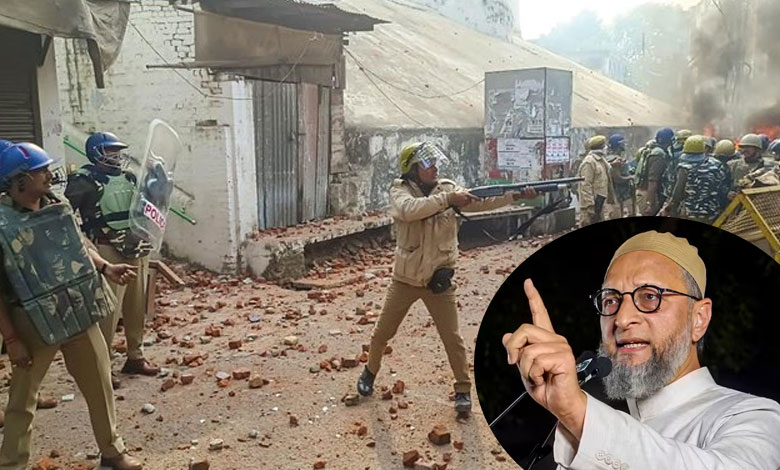Owaisi Calls Sambhal Police Firing “Murder” After Four Muslim Men Killed in Protests
Asaduddin Owaisi, the chief of AIMIM and Member of Parliament from Hyderabad, strongly condemned the police firing that led to the deaths of four Muslim men in Sambhal on November 24.

Sambhal, Uttar Pradesh: Asaduddin Owaisi, the chief of AIMIM and Member of Parliament from Hyderabad, strongly condemned the police firing that led to the deaths of four Muslim men in Sambhal on November 24. The tragic incident occurred during protests against a court-ordered survey of the historic Shahi Jama Masjid, which has sparked tensions in the region.
Owaisi expressed outrage over the police action, calling the deaths a case of murder rather than mere firing. He questioned the police’s decision to open fire on a crowd of peaceful protesters, emphasizing that the victims were only exercising their constitutional right to protest under Article 19(1) of the Indian Constitution.
Speaking to news agency PTI, Owaisi said, “The mosque in Sambhal is not a recent structure; it is 200-250 years old. The court passed an ex-parte order without even hearing the caretakers of the mosque, which is absolutely wrong. What happened there is not firing—it is murder.
Tensions Escalate Over Mosque Survey
Tensions had been rising in Sambhal since Tuesday when a local court ordered a survey of the Jama Masjid following claims that a Hindu temple stood at the site. The Jama Masjid, a Mughal-era mosque built in the 16th century by Emperor Babur, is listed as a heritage monument by the Sambhal district.
The petition that led to the survey was filed by senior advocate Vishnu Shankar Jain, who is known for representing similar cases such as the Krishna Janmabhoomi and Gyanvapi mosque disputes. Jain’s petition alleges that the Jama Masjid was originally a Hindu temple.
On Sunday, a second survey was conducted under the supervision of an “advocate commissioner,” which led to a clash between a Muslim crowd and a Hindutva mob chanting “Jai Shri Ram” slogans. During the altercation, the police opened fire on the protesters. Three individuals—Noman, Naeem (28), and Mohd Bilal Ansari (25)—were killed, and a fourth victim later succumbed to injuries.
Police Allegations and Victims’ Families
The police claim that the protesters attempted to set government vehicles on fire, threw stones, and even fired gunshots, though investigations into the source of the gunshots are still ongoing.
The families of the deceased have accused the Uttar Pradesh police of carrying out extrajudicial killings, asserting that the victims were unjustly targeted. Owaisi, in his statement, expressed his anger and sorrow, asking, “How much more blood must be spilled, my fellow countrymen?”
Political Reaction and Curfew Imposed
Opposition leaders, including Congress leader Rahul Gandhi, have condemned the police’s actions, accusing the BJP-led government of instigating communal tensions and failing to maintain peace during this sensitive situation. Gandhi has called for the Supreme Court’s intervention to ensure justice for the victims’ families.
In response to the escalating violence, the district administration has imposed a curfew and prohibited outsiders from entering the district until November 30. The order, issued by District Magistrate Rajender Pensiya, restricts public movement and mandates that only those with permission from the authorities may enter. Violating this order is punishable under Indian law.
